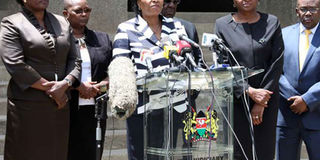Interviews for vacant judiciary posts to start after public input

Public Service Commission boss Margaret Kobia addresses the media on the progress of investigations into the alleged bribery claims levelled against Justice Philip Tunoi, now retired. She has said the JSC is set to interview candidates for judiciary positions. PHOTO | JEFF ANGOTE | NATION MEDIA GROUP
What you need to know:
- The three positions fell vacant following the retirement of CJ Willy Mutunga, Deputy CJ Kalpana Rawal and Justice Philip Tunoi.
- The commission on Friday published the names of applicants and the shortlisted candidates, kicking off a 21-day period for the public to submit petitions before the interviews begin.
Interviews for the three vacant top judiciary positions are expected to start on August 29.
The interviews will run until October 7 after which the Judicial Service Commission will be expected to nominate a person for each of the three vacant positions of chief justice, deputy chief justice and Supreme Court judge.
The three positions fell vacant following the retirement of CJ Willy Mutunga, Deputy CJ Kalpana Rawal and Justice Philip Tunoi.
“JSC Act gives 21 days for public participation. We would want Kenyans who have interacted with the shortlisted candidates in professional and social circles to come forward and tell us what they know about them so that at the end of the day we get the most qualified persons to fill the three positions.
After the 21 days, we will take time to analyse the petitions that would have been received from the public,” acting JSC Chairperson Margaret Kobia said.
The JSC Act requires that the commission sends a name for each position to the President for appointment.
The nominees to the three judicial positions are expected to be revealed on the same day.
The commission on Friday published the names of applicants and the shortlisted candidates, kicking off a 21-day period for the public to submit petitions before the interviews begin.
“By all fairness, it would be good to release the three nominees to the President together. This is based on the assumption that nothing will come in between which could disrupt the calendar, like if someone goes to court to challenge the process,” Prof Kobia said.
The position of the Chief Justice, which attracted 14 applicants, has six candidates shortlisted.
These are Supreme Court judge Justice Smokin Wanjala, Appeal Court judges Alnashir Visram, Roselyne Nambuye and David Maraga, and High Court judge Mbogholi Msagha.
Lawyer Nzamba Kitonga is the only one among the shortlisted candidates who is currently not serving on the bench.
The shortlist for Deputy Chief Justice vacancy is a women affair after the JSC left out the only male candidate for the same position, lawyer David Waihiga.
The Supreme Court position, meanwhile, has a shortlist of 18. The JSC says Dr Wanjala will not get any special treatment despite having been a member of the commission until recently when he stepped aside to submit his application for the vacant Chief Justice position.
“People are saying so much, but he has a right to apply and he will not be advantaged or disadvantaged in any way. He will be treated like any other applicant,” said Prof Kobia.
Dr Wanjala was the Supreme Court representative in the JSC, which is now left with nine members following the exit of the retired Chief Justice Willy Mutunga and Dr Wanjala.
Without them, JSC is now composed of Prof Kobia, Attorney-General Githu Muigai, Court of Appeal Justice Mohamed Warsame, High Court Justice Aggrey Muchelule, Law Society of Kenya (LSK) representatives Tom Ojienda and Ms Mercy Mwarah Deche, Chief Magistrate Emily Ominde, Kipng’etich arap Korir Bett and Winifred Guchu.





